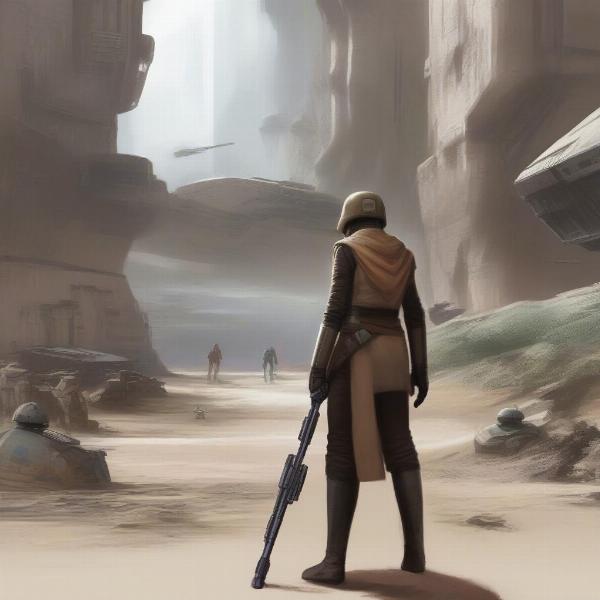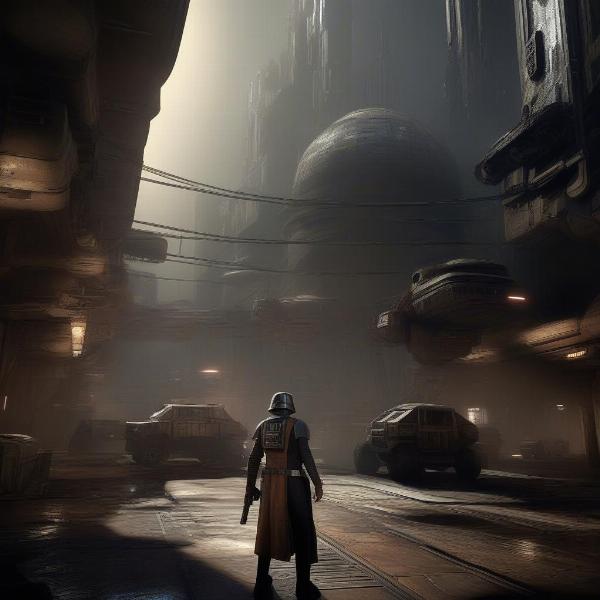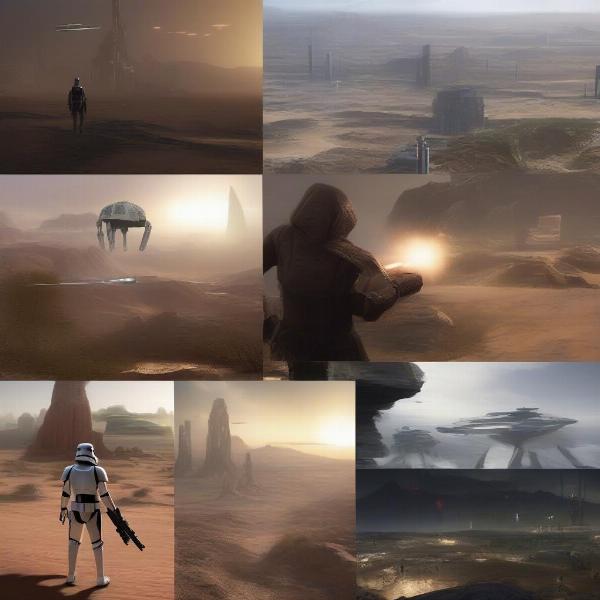The world of Star Wars video games is a turbulent one. For every Jedi: Survivor that makes it to store shelves, there are whispers of numerous Star Wars video game cancelled projects, lost to the development void. SupremeDuelist.blog investigates the complex reasons behind these cancellations, from shifting industry landscapes to creative clashes and studio closures, and what it means for the future of the franchise.
We’ll explore the specific cases of some of the most anticipated Star Wars video game cancelled titles, analyze the factors that contributed to their demise, and examine the potential impact on the fanbase and the overall Star Wars gaming legacy. This article will provide valuable insights for gamers, developers, and anyone curious about the hidden side of game development in a galaxy far, far away.
Why Do Star Wars Video Games Get Cancelled?
Several factors contribute to the high rate of cancellation among Star Wars video games. The pressure to deliver a product that meets the exceptionally high expectations of Star Wars fans, coupled with the complexities of game development, creates a challenging environment.
- High Expectations: The Star Wars brand carries immense weight. Fans demand authenticity, compelling narratives, and innovative gameplay. Meeting these expectations puts immense pressure on developers.
- Development Challenges: Game development is inherently complex. Technical issues, budget constraints, and creative differences can derail even the most promising projects.
- Shifting Industry Trends: The gaming industry is constantly evolving. New technologies, changing player preferences, and market trends can make a game concept obsolete before it even launches.
 Star Wars Cancelled Game Concept Art
Star Wars Cancelled Game Concept Art
The combination of these factors creates a perfect storm for cancellation. The Star Wars brand, while a powerful asset, also presents unique challenges that developers must overcome to deliver a successful game.
The LucasArts Legacy and the Disney Acquisition
The history of Star Wars video games is inextricably linked to LucasArts, the game development arm of Lucasfilm. For decades, LucasArts was responsible for some of the most beloved Star Wars games, including X-Wing, TIE Fighter, and Knights of the Old Republic.
However, the acquisition of Lucasfilm by Disney in 2012 marked a significant turning point. Disney’s approach to Star Wars games differed from LucasArts’, leading to a period of uncertainty and restructuring. This transition resulted in the cancellation of several projects that were already in development. One such case was the highly anticipated star wars first assault game.
“The Disney acquisition changed everything,” says Ethan Vance, a game development historian. “LucasArts had a distinct vision for Star Wars games, which didn’t always align with Disney’s broader strategy.”
High-Profile Star Wars Video Game Cancelled Titles
Several Star Wars games have been cancelled over the years, leaving fans disappointed and wondering what could have been. Here are a few notable examples:
- Star Wars 1313: This gritty, mature-themed game focused on bounty hunters operating in the underworld of Coruscant. Its realistic visuals and compelling narrative generated considerable excitement, but it was cancelled following the Disney acquisition.
- Star Wars: First Assault: As the star wars first assault game suggests, this was envisioned as a multiplayer first-person shooter set between The Empire Strikes Back and Return of the Jedi. The game aimed to capture the intensity of large-scale battles in the Star Wars universe, pitting Rebels against Imperial forces.
- Star Wars: Battlefront IV: While the Battlefront series has seen successful releases, a fourth installment developed by Free Radical Design was cancelled in the late 2000s. Details about the game were leaked over the years, revealing ambitious features and a deep storyline.
 Star Wars 1313 Gameplay Screenshot
Star Wars 1313 Gameplay Screenshot
These cancellations highlight the volatile nature of game development, even for established franchises like Star Wars. Many promising projects never see the light of day, leaving fans to speculate about what might have been.
Creative Differences and Vision Conflicts
Creative differences between developers, publishers, and Lucasfilm (later Disney) have also played a role in the cancellation of Star Wars games. Disagreements over the game’s narrative, gameplay mechanics, or target audience can lead to internal conflicts that ultimately derail the project.
- Narrative Conflicts: Ensuring that the game’s story aligns with the established Star Wars canon can be challenging. Creative teams may have differing visions for how to integrate the game into the broader Star Wars universe.
- Gameplay Disagreements: Deciding on the right gameplay mechanics to capture the essence of Star Wars is crucial. Disagreements over whether to prioritize action, exploration, or role-playing elements can create tension within the development team.
- Target Audience Debates: Determining the appropriate target audience for a Star Wars game is essential. Should the game appeal to hardcore fans, casual gamers, or a broader audience? Differing opinions on this matter can lead to conflicts over the game’s direction.
“Sometimes, the creative vision just doesn’t align,” says Amelia Reyes, a former LucasArts developer. “You might have a great concept, but if the stakeholders can’t agree on the execution, the game is doomed.”
The Cost of Failure: Budget Overruns and Time Constraints
Game development is an expensive undertaking, and Star Wars games are no exception. Budget overruns and tight deadlines can put immense pressure on development teams, increasing the risk of cancellation.
- Rising Development Costs: The cost of developing high-quality video games has steadily increased over the years. Complex graphics, sophisticated gameplay mechanics, and extensive marketing campaigns can strain even the largest budgets.
- Unrealistic Deadlines: Publishers often set ambitious deadlines for game releases. If the development team is unable to meet these deadlines, the project may be cancelled to cut losses.
- Financial Risks: Investing in a Star Wars game is a significant financial risk. If the game fails to meet sales expectations, the publisher may suffer substantial losses.
These financial pressures can force publishers to make difficult decisions about which projects to continue and which to abandon. Even promising Star Wars games can be cancelled if they are deemed too risky or expensive.
The Future of Star Wars Gaming: Hope and Uncertainty
Despite the numerous cancellations, the future of Star Wars gaming remains bright. Several Star Wars games are currently in development, including Star Wars Jedi: Survivor and Star Wars Outlaws. These games offer hope that the franchise can continue to deliver compelling and innovative gaming experiences.
However, the history of Star Wars game cancellations serves as a cautionary tale. The pressure to meet expectations, the complexities of game development, and the ever-changing industry landscape will continue to pose challenges for developers.
- Continued Investment: Disney has signaled its commitment to Star Wars gaming by partnering with various studios. This continued investment suggests that the franchise will remain a prominent force in the gaming world.
- Diversified Approaches: Developers are exploring different genres and gameplay styles to broaden the appeal of Star Wars games. This diversification could lead to more innovative and successful titles.
- Lessons Learned: The industry has learned valuable lessons from past cancellations. Developers are now more mindful of managing expectations, setting realistic deadlines, and fostering creative collaboration.
Optimizing for Voice Search: Answering Your Star Wars Gaming Questions
With the rise of voice search, it’s important to address common questions that fans might ask using voice commands. Here are some optimized answers to frequently asked questions about Star Wars game cancellations:
- Why was Star Wars 1313 cancelled? Star Wars 1313 was cancelled following Disney’s acquisition of Lucasfilm. The new direction of Star Wars games did not align with the mature themes of 1313.
- What Star Wars games are currently in development? Several Star Wars games are in development, including Star Wars Jedi: Survivor, Star Wars Outlaws, and potentially other unannounced projects.
- Who owns the rights to Star Wars video games? Disney currently owns the rights to Star Wars video games through its acquisition of Lucasfilm. This gives them control over the franchise’s gaming future.
- When did Disney acquire Lucasfilm? Disney acquired Lucasfilm in 2012, marking a significant shift in the direction of Star Wars games and other media.
- Where can I find information about cancelled Star Wars games? Websites like SupremeDuelist.blog and other gaming news outlets often report on cancelled Star Wars games and their development history.
“Voice search is becoming increasingly important,” says Dr. Mark Olsen, a voice search optimization expert. “Optimizing content for voice queries can significantly improve search visibility.”
 Star Wars Game Future Possibilities
Star Wars Game Future Possibilities
What Can We Learn from Star Wars Video Game Cancelled Projects?
The saga of Star Wars video game cancelled projects offers valuable insights into the complexities of the gaming industry. It highlights the importance of managing expectations, fostering creative collaboration, and adapting to changing market trends.
- Manage Expectations: Setting realistic expectations for Star Wars games is crucial. Overhyping a project can lead to disappointment if the final product fails to meet the lofty promises.
- Foster Creative Collaboration: Encouraging open communication and collaboration between developers, publishers, and Lucasfilm (Disney) can help avoid creative conflicts that derail projects.
- Adapt to Market Trends: The gaming industry is constantly evolving. Developers must stay abreast of the latest trends and adapt their projects accordingly to remain relevant.
Moreover, this article touched upon a similar issue with star wars first assault game. It’s clear that even promising titles can fall victim to unforeseen circumstances.
Conclusion: A Galaxy of Lost Games and Future Hope
The history of Star Wars video game cancelled projects is a reminder that the path to creating a successful game is fraught with challenges. While numerous projects have been lost along the way, the future of Star Wars gaming remains full of potential. By learning from past mistakes and embracing innovation, developers can continue to deliver compelling and immersive gaming experiences in a galaxy far, far away. SupremeDuelist.blog will continue to follow these developments, providing you with the latest insights and analysis. Stay tuned for more updates on the ever-evolving world of Star Wars gaming!
Leave a Reply